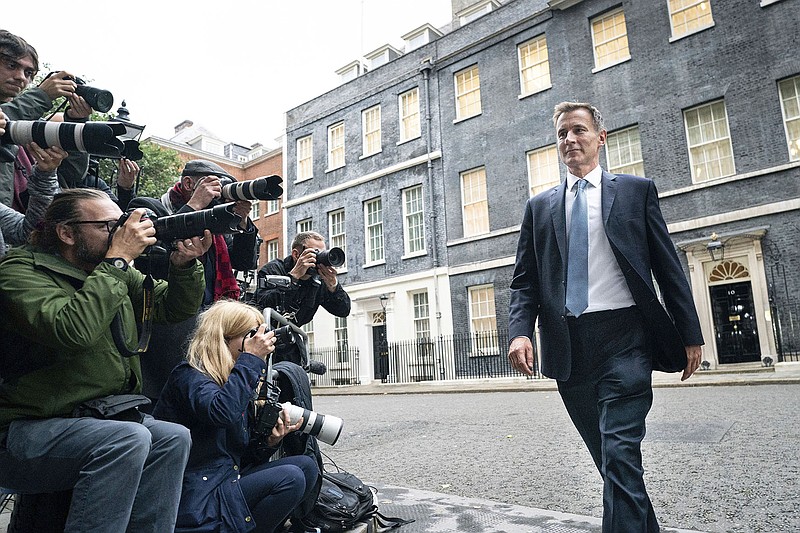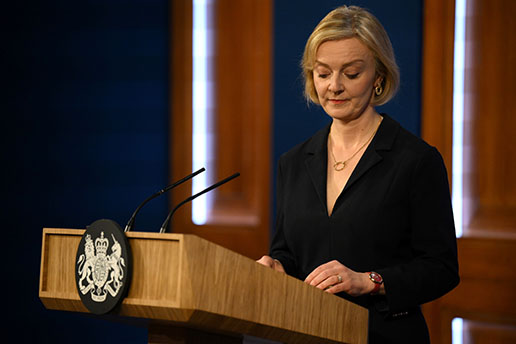LONDON -- Britain's prime minister, Liz Truss, suffered a new setback Saturday when the free market, libertarian economic policy program on which she won power was repudiated by the politician she appointed to try to restore the country's financial stability.
In an attempt Friday to salvage her faltering leadership, Truss reversed one key tax policy, fired her ally, Kwasi Kwarteng, as chancellor of the Exchequer, and replaced him with Jeremy Hunt -- a more pragmatic former Cabinet veteran.
Whether that will prove enough to save Truss, whose authority seems to be ebbing after less than six weeks in Downing Street, remains to be seen. On Saturday, Hunt called time on what the British media have called "Trussonomics" -- Britain's brief, ill-fated experiment in promising unfunded tax cuts theoretically paid for by anticipated economic growth generated by lower taxation rates and structural changes.
That strategy, fleshed out by Kwarteng on Sept. 23, sent the pound sterling plunging and raised borrowing costs for the government, a development that rippled through into the domestic housing loan market.
Seeking to steady the ship, Hunt, a former foreign and health secretary, on Saturday embraced traditional economic orthodoxy -- something Truss had railed against during the summer campaign to become the leader of the Conservative Party and, hence, prime minister.
In an interview with the BBC, Hunt said some taxes would now go up, while others would "not be cut as quickly as people want." Spending on government programs "will not rise by as much as people would like," he added, preparing voters for some painful cuts in budgets already ravaged by rampant inflation.
"What you got in today's interview was Jeremy Hunt indicating to the outside world that he gets the extent of the credibility loss, and what's needed in terms of a reset," said Jill Rutter, a former civil servant and a senior fellow at the Institute for Government, a London-based research group.
"But he's also signaling to the rest of the government, effectively, that he has taken back control of economic policy from No. 10," she added, referring to Downing Street, the prime minister's office.
That underscored the fact that the abject failure of Truss' signature economic plan has left her "hanging by a thread," in the words of William Hague, a former Conservative Party leader, with her own lawmakers privately debating whether, and how, she could be removed.
Kwarteng was a political ally and a close friend of Truss', and the policies he outlined had been drafted with her. So critics question the point of her premiership now that her economic policy has been neutered.
The British prime minister also faced criticism for holding a brief news conference Friday after announcing Kwarteng's departure, lasting just eight minutes and 21 seconds.
Reflecting on Friday's political chaos, the front page of The Daily Mail, which had been supportive of Truss, showed a photograph of her alongside the headline, "How Much More Can She (and the Rest of Us Take)?"
She has also become the butt of quintessentially British jokes -- most notably by being compared to a head of lettuce by The Economist newspaper, which is considered one of the world's preeminent news journals, and The Daily Star, an entertainment-focused tabloid that brands itself the "home of fun stuff" and regularly features photos of scantily-clad celebrities.
The gag began in an article by The Economist, which last week dubbed Truss "The Iceberg Lady," bluntly predicting her career has "the shelf-life of a lettuce."
By Friday, the Daily Star was offering its readers a live-stream camera feed of a store-bought lettuce -- worth just under a dollar and with a shelf-life of around 10 days -- positioned next to a framed photograph of Truss, accompanied by the question: "Day one: Which wet lettuce will last longer?"
The live-stream decay has since attracted more than 350,000 viewers, as people tune in to see whether Truss's political career or the salad staple, which briefly donned a wig and googly eyes, will expire faster.
The Daily Star accused Truss of being a "lame duck PM" following a "shambolic day."
The hashtag "#lettuceliz" was gaining steam Saturday on social media, with users unsure whether to laugh or cry at the state of national affairs.
"That's just the tip of the iceberg," wrote one person on Twitter. "Brilliant," wrote another.
Some online complained they had cheese in the fridge that had lasted longer than Kwarteng's spell in office, while one trans-Atlantic observer quipped:
"In the U.S. we measure such things in Scaramuccis," referring to Anthony Scaramucci -- the short-serving White House communications director, who lasted less than a week in the Trump administration.
POLITICAL TURBULENCE
Even for a country that has gone through six years of political turbulence since the Brexit referendum in 2016, recent months have been extraordinary. Hunt's appointment Friday made him the fourth person to hold the position of chancellor of the Exchequer in four months.
Although he praised Kwarteng for his plans to protect consumers from rising energy costs, Hunt acknowledged that his predecessor had spooked financial markets by failing to explain how he would fund tax cuts that were unveiled in the announcement made Sept. 23.
Crucially, Kwarteng had also sidelined the Office for Budget Responsibility, an independent watchdog that scrutinizes such plans, a decision described by Hunt as a mistake that had left the government to "fly blind" while sending the pound and the bond market into a free fall.
On Friday, Truss said she would, after all, increase corporate taxes, something she had pledged not to do, a move that she said would raise about $20 billion. But that still leaves a substantial hole in the public finances that Hunt will have to fill when he announces revised plans Oct. 31.
That will not be easy. As a former health secretary, Hunt knows that there is limited scope to make what he called "efficiency savings" in public services that are already strained to the breaking point.
"In the Treasury, there is no point in penciling in big spending cuts that then you are forced to reverse on because services collapse," said Rutter, who is a former official of that government department.
With the financial community scrutinizing the government's every move, reestablishing credibility is supremely important, she said.
"You need to be convinced that spending cuts will stick -- that you have the ability to deliver them, but also the political appetite to do it," she added, noting that it might instead prove necessary to roll back Truss' last significant tax cut, a reduction in the basic rate of income tax.
Against this backdrop, support for the Conservative Party has collapsed in opinion polls. That has left many of its members of Parliament in fear of losing their seats in the next general election, which must be held no later than January 2025.
So bad are the party's ratings that some lawmakers think replacing Truss is their only chance of remaining in Parliament, but the mechanics of doing so are difficult. It would take a change in the rulebook to challenge her before next September.
While that is possible, few have the stomach for another lengthy leadership contest, which would only reinforce the party's image of haplessness. To avoid that, the party would have to rally around a consensus figure, and there is no sign of that at present.
In the short term, much focus will be on the performance of Hunt, a moderate who voted against Brexit in 2016 and supported Rishi Sunak, the former chancellor, who challenged Truss in the leadership contest this summer and called her economic plan a "fairy tale."
For Hunt, becoming chancellor of the Exchequer is a remarkable turnaround. In 2019, when he was foreign secretary, he contested the Conservative Party leadership but lost out to Boris Johnson, who was recently ousted as prime minister after a succession of ethics scandals and whom Truss replaced.
Although a generally soothing figure, Hunt criticized Johnson in that campaign, accusing him of cowardice for avoiding media scrutiny. When Johnson won, Hunt was sidelined from government and consigned to the backbenches, where he led a select committee on health.
Hunt ran again for the leadership this year, after Johnson was forced to resign, but fell well short, winning little support from his fellow lawmakers.
"It's become obvious to me you only get one big shot at this, and I had mine in 2019," he wrote on Twitter at the time.
Only a few months later, Hunt finds himself in the second most important job in government, arguably with much more power than his boss, who is fighting to stay in Downing Street and who cannot afford to fire a second chancellor of the Exchequer.
The prime minister is "clearly on thin ice," said Rutter, who added, "Liz Truss at the moment looks like a prime minister in name only."
Information for this article was contributed by Stephen Castle of The New York Times and by Adela Suliman, Karla Adam and William Booth of The Washington Post.


